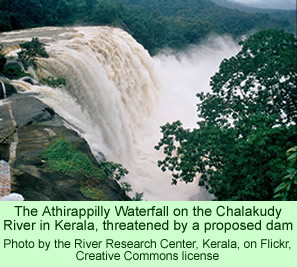A peaceful Kadar village, as well as a biologically diverse forest and the famed Athirappilly Waterall, would be destroyed by the proposed
 Athirappilly Dam in India’s Kerala state, but proponents do not seem to give up. The Union Minister of Forests and Environment decided in February to revoke permission from the Indian central government for the state to proceed with the dam construction on the Chalakudy River, but that did not stop continued agitation for the dam, and heated opposition against it, in Kerala last week.
Athirappilly Dam in India’s Kerala state, but proponents do not seem to give up. The Union Minister of Forests and Environment decided in February to revoke permission from the Indian central government for the state to proceed with the dam construction on the Chalakudy River, but that did not stop continued agitation for the dam, and heated opposition against it, in Kerala last week.
On Friday, the Communist Party of India (CPI) and another organization with which it is normally allied, the All-India Trade Union Congress (AITUC), expressed public differences over the proposed dam. The communists, who have a long history in Kerala, decided to oppose the project. K.K. Shelly, a district executive committee member of the CPI, is also the chairman of the Chalakudy River Protection Forum, one of the leading organizations opposed to the dam. He indicated that an environmental subcommittee of the party had already passed a resolution condemning it.
The All India Youth Federation (AIYF), the youth wing of the CPI, had expressed its disapproval in May. The secretary of the AIYF, K. Rajan, indicated that his group believed “the project will certainly harm [the] environment.”
The AITUC, the trade union federation, disagreed. A.N. Rajan, the State Secretary of the AITUC, who is also the president of the Kerala Electricity Workers Federation, argued that “if implemented with proper environmental protection control systems, the Athirappilly project can contribute richly to the State’s power needs.” In other words, building the dam would mean jobs.
At a conference in the city of Thrissur, Kerala, on Friday, Kanam Rajendran, the general secretary of the state AITUC, urged the construction of the dam—as long as appropriate environmental protections were in place. He said it was essential that construction work should have a minimal impact on the environment, but he also suggested that environmentalists should be reasonable. “They should approach environmental protection issues keeping in mind human development needs,”’ he said.
None of the Kerala leaders last week mentioned the situation of the Kadar people, who will lose their village if the dam is built.